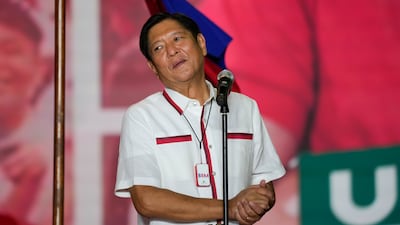In Washington, there is a hawkish foreign policy establishment composed of both Democrats and Republicans, bent on “championing the old-time gospel of American leadership on the world stage” as the US news website Politico recently put it, known as “the blob”. That group of people is associated with the use of armed force. But there is another kind of “blob” made up of elite liberal opinion-formers and leaders on both sides of the Atlantic, comprising all of the Democratic Party, some Republicans, most heads of Western European governments, countless NGOs and think tanks, and much of the respectable mainstream – and probably all of the state-run – media.
This blob will be very unhappy indeed at the expected landslide victory by Ferdinand Marcos Jr in the Philippines’ presidential election. “Bongbong”, as he is known, is the unrepentant son of a kleptocratic dictator, they will say. Nostalgia for the rule of Ferdinand Marcos Sr (1965-86) shows that the country’s democracy is in danger, and that the Philippines is succumbing to the insidious appeal of populist authoritarianism that has swept much of the globe. Whereupon members of this blob never forget to mention Brexit, the UK’s decision to leave the EU, and the election of Donald Trump as US president in 2016.
This very wide range of people with enormous influence and power see these events not as part of the give and take of politics. They see them as morally wrong. Further, they believe them to be illegitimate outcomes because, they assert, they were won with misinformation.

As if on cue, here was the Philippine journalist and Nobel Laureate Maria Ressa on Monday. Referring to the election of the decidedly no-nonsense Rodrigo Duterte as president in 2016, and then to Mr Marcos’s likely succession, she accused their supporters of “impacting” and “changing” reality. She said: “This is a global information ecosystem. Like in 2016, we were the first domino to fall followed by Brexit, Trump, Bolsonaro – well here you go again. Brazil has elections in October, the US has elections in November. So if we fall, stay tuned, it’s coming for you.”

The bigger point is that it is misguided, oversimplistic and offensive for many to paint these political events as all instances of one trend. Neither should the voters responsible be lumped together as one.
The religious right supported Mr Trump, for instance, because he gave them a lot of what they wanted, including a Supreme Court that seems poised to reverse Roe v Wade. Not all Trump supporters were the “Maga” rednecks of liberal satire.
Brexit supporters on the left – the historical home of British Euroscepticism – bristle resentfully at being associated with anyone who voted for Mr Trump, and cannot see how their opposition to leaders of the EU’s executive arm not being elected by their subjects could possibly translate to supporting populist authoritarianism.
Many Filipinos voted for Mr Marcos as – rightly or wrongly – they viewed him and his family as individuals who actually made a difference to ordinary people's lives. This includes people who were alive when Marcos Sr was in power.
But the transatlantic blob would insist that no one in full possession of the facts and of sound mind could support any of these results. If they are not being misled by misinformation or suffering, as the Marxists say, from “false consciousness” (like low-income Americans who vote for tax cuts that will never benefit them), there then must be other reasons. Here the members of this blob manage to conceal the contempt they feel for those who support the “wrong” policies or people most of the time – which makes it all the more instructive when the mask slips.

If contempt sounds too strong a word, remember Hillary Clinton’s description of about half of Mr Trump’s supporters in 2016. You could put them, she said, “into what I call the basket of deplorables… They're racist, sexist, homophobic, xenophobic, Islamophobic – you name it”. Given Mr Trump’s score of 46 per cent in the presidential race, that appears to be Mrs Clinton’s unvarnished opinion of 23 per cent of the US electorate. Similarly I recall an arch-Remainer relative telling me bitterly that the Brexit vote was down to “stupid northerners who didn’t know what they were voting for”.
Lack of brain power is often elided with lack of wealth. Wait for the analyses pointing out that many of Mr Marcos’s supporters were “poor”. As it happens I know several Filipinos who are huge supporters of Bongbong. Yes, their incomes are low, but I can attest to their intelligence. Why should their views be any less valid?
But to this blob, choices of which they don’t approve are unacceptable. This doesn’t just go against the democratic values they constantly preach, it is also profoundly disrespectful. It would be more constructive if, instead of being so hasty to condemn, they spent more time trying to understand why others support policies or politicians they find so distasteful.
Then next time a country produces a president Bongbong or Trump they might not be so surprised. They might also be better able to engage with voters whose decisions they dislike if, rather than dismissing them as a mass of “deplorables” deserving only of their condescension, they considered them as individuals, who may be driven by a multiplicity of reasons. They might find, to their surprise, that some of these individuals' motivations are quite reasonable. If they can get over themselves, members of the blob might even learn from them.














